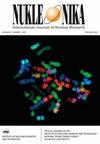Characterizing urban pollution variability in Central Poland using radon-222
IF 0.3
4区 物理与天体物理
Q4 CHEMISTRY, INORGANIC & NUCLEAR
引用次数: 1
Abstract
Abstract Four years of observations of radon, meteorology and atmospheric pollution was used to demonstrate the efficacy of combined diurnal and synoptic timescale radon-based stability classification schemes in relating atmospheric mixing state to urban air quality in Zgierz, Central Poland. Nocturnal radon measurements were used to identify and remove periods of non-stationary synoptic behaviour (13–18% of each season) and classify the remaining data into five mixing states, including persistent temperature inversion (PTI) conditions, and non-PTI conditions with nocturnal conditions ranging from well mixed to stable. Mixing state classifications were performed completely independently of site meteorological measurements. World Health Organization guideline values for daily PM2.5/PM10 were exceeded only under strong PTI conditions (3–15% of non-summer months) or often under non-PTI stable nocturnal conditions (14–20% of all months), when minimum nocturnal mean wind speeds were also recorded. In non-summer months, diurnal amplitudes of NO (CO) increased by the factors of 2–12 (3–7) from well-mixed nocturnal conditions to PTI conditions, with peak concentrations occurring in the morning/evening commuting periods. Analysis of observations within radon-derived atmospheric mixing ‘class types’ was carried out to substantially clarify relationships between meteorological and air quality parameters (e.g. wind speed vs. PM2.5 concentration, and atmospheric mixing depth vs. PM10 concentration).用氡-222表征波兰中部城市污染变异性
摘要利用四年来对氡、气象和大气污染的观测,证明了基于氡的日尺度和天气时间尺度组合稳定性分类方案在将波兰中部兹捷尔茨的大气混合状态与城市空气质量联系起来方面的有效性。夜间氡测量用于识别和消除非平稳天气行为的周期(每个季节的13-18%),并将剩余数据分为五种混合状态,包括持续逆温(PTI)条件和夜间条件从良好混合到稳定的非PTI条件。混合状态分类完全独立于现场气象测量进行。世界卫生组织每日PM2.5/PM10的指导值仅在强烈的PTI条件下(非夏季月份的3-15%)或通常在非PTI稳定的夜间条件下(所有月份的14-20%)超过,同时还记录了最低夜间平均风速。在非夏季月份,从混合良好的夜间条件到PTI条件,NO(CO)的日振幅增加了2–12(3–7)倍,峰值浓度出现在早晚通勤时段。对氡衍生的大气混合“类别”内的观测结果进行了分析,以充分阐明气象和空气质量参数之间的关系(例如风速与PM2.5浓度的关系,以及大气混合深度与PM10浓度的关系)。
本文章由计算机程序翻译,如有差异,请以英文原文为准。
求助全文
约1分钟内获得全文
求助全文
来源期刊

Nukleonika
物理-无机化学与核化学
CiteScore
2.00
自引率
0.00%
发文量
5
审稿时长
4-8 weeks
期刊介绍:
"Nukleonika" is an international peer-reviewed, scientific journal publishing original top quality papers on fundamental, experimental, applied and theoretical aspects of nuclear sciences.
The fields of research include:
radiochemistry, radiation measurements, application of radionuclides in various branches of science and technology, chemistry of f-block elements, radiation chemistry, radiation physics, activation analysis, nuclear medicine, radiobiology, radiation safety, nuclear industrial electronics, environmental protection, radioactive wastes, nuclear technologies in material and process engineering, radioisotope diagnostic methods of engineering objects, nuclear physics, nuclear reactors and nuclear power, reactor physics, nuclear safety, fuel cycle, reactor calculations, nuclear chemical engineering, nuclear fusion, plasma physics etc.
 求助内容:
求助内容: 应助结果提醒方式:
应助结果提醒方式:


